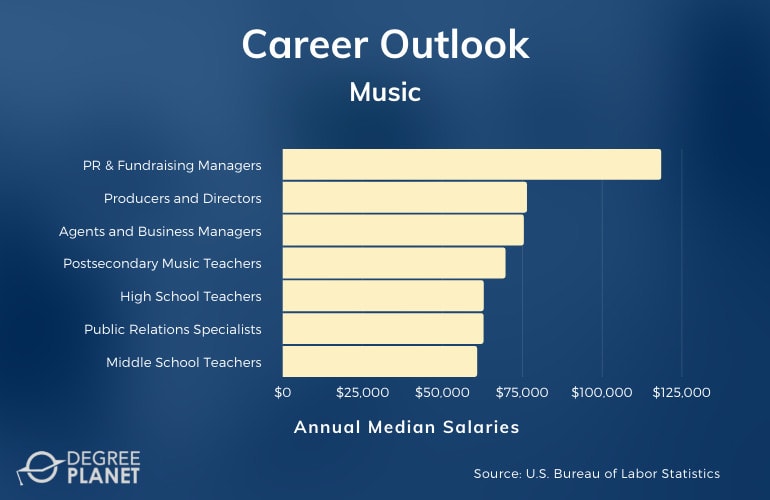If you have always loved music, you might be considering getting an online music degree.

College music studies can prepare students for jobs in entertainment, business, education, and other sectors. Online colleges for music may help you turn your passion for notes and rhythms into a career that interests you.
Editorial Listing ShortCode:
Not everyone plays the same role in the music industry, but your college program may help you find your place in this exciting field.
Music Degrees Online

If music is in your blood, then a career in the music industry might be a good fit for you. Many people with the drive to earn a music degree have exceptional musical abilities and are interested in a recording or performing career. Others may want to work a behind-the-scenes job in the music industry or teach others musical skills. No matter which aspect of this field appeals to you, online music bachelor degrees can help you get started.
For a music degree, you’ll likely study topics like:
- Ear training
- Global music styles
- History of music
- Music theory
- Piano fundamentals
- Teaching methods
- Vocal performance
Music students often select a concentration. The options for performance concentrations can include voice, guitar, piano or another instrument. Schools can also offer concentrations related to composing songs, teaching students, or working in the music business.
Editorial Listing ShortCode:
Courses can vary greatly from one concentration to the next. Music degrees can lead to a wide variety of careers. Examples include musical theater director, business manager, recording technician, and school music teacher. Some graduates also become performers who work part-time or full-time in the entertainment business.
Common Bachelor’s Degree in Music Concentrations

Because there are so many different careers that fall into the music category, college students often select a degree concentration so that they can focus on one particular area of this field.
While concentration options vary from school to school, some common ones are listed below:
- Music Theory and Composition. In this concentration, you can study the fundamentals of music arrangement and learn to put together pieces for a single performer or an entire symphony.
- Music Performance. To prepare students for careers as professional singers or musicians, this degree program emphasizes voice or instrument skills and includes many one-on-one lessons and graded performances.
- Music Education. College students who want to become educators need to take teacher-preparation courses in addition to a core set of music classes. That way, they can be ready to earn state teaching licensure.
- Music Industry. With courses on business, law, and music theory, this concentration can help you get ready for a behind-the-scenes role in the world of music. It may be useful for those interested in production, publicity, and artist representation.
- Music Production. In a production track, you can learn to operate sound engineering equipment that can be used in performance or recording settings.
- Music Business. In this specialty track, you can learn business fundamentals and gain specialized knowledge about applying those principles in music-related settings.
The curriculum can be quite different from one concentration to the next. For example, education students take multiple courses on teaching methods and classroom management, while business students study marketing and public relations.
Bachelor in Music Careers & Salaries

As a music major, you might want to work in the performance, music business, or education industry.
Performers may sing or play instruments. Some work regular hours, but many perform on an as-needed basis. They can provide entertainment for events or participate in performing arts shows. Musicians and singers can also contribute to recording sessions. Some become well-known performers who secure record deals and performance tours.
Music professionals can use their skills to enhance others’ performance abilities. Some work as lyricists or composers, preparing music for performers. Others work as directors or producers, bringing shows or recordings to life. Music experts can also become sound technicians who operate equipment during recording sessions or live performances.
According to the Bureau of Labor Statistics, there are various types of careers you may qualify for in the music industry, depending on your experience and chosen specialization.
| Careers | Annual Median Salaries |
| Public Relations and Fundraising Managers | $118,430 |
| Producers and Directors | $76,400 |
| Agents and Business Managers of Artists, Performers, and Athletes | $75,420 |
| Postsecondary Art, Drama, and Music Teachers | $69,690 |
| High School Teachers | $62,870 |
| Public Relations Specialists | $62,810 |
| Middle School Teachers | $60,810 |
| Kindergarten and Elementary School Teachers | $60,660 |
| Sound Engineering Technicians | $53,520 |
| Music Directors and Composers | $52,250 |
The Bureau of Labor Statistics does not list annual earnings for musicians and singers since most work part-time or intermittently, but the median hourly wage for these positions is $31.40.
Singers and musicians sometimes need business professionals who can handle their affairs. Some music school graduates become public relations personnel, agents, or business managers for artists.
Editorial Listing ShortCode:
Music degrees can also lead to education careers. Some graduates teach private or group lessons, and they may be self-employed or work for music programs. Others teach music classes in public or private schools. They may instruct elementary, junior high, or high school students. Teaching licensure is usually required.
Music professionals who earn a masters or doctoral degree may eventually teach at the college level.
Bachelor of Music Online Curriculum & Courses

Music majors take a variety of interesting classes to develop their musical skills and to prepare for work in the industry. Here are examples of courses you may take in a music degree program:
- Arrangement for Ensembles: You can learn to assign parts and direct groups so that multiple performers work together to create a unified sound that’s pleasing to listeners.
- Composition Fundamentals: In a composition class, you’ll take what you’ve learned about music theory and use it to create musical pieces of your own.
- Ear Training: Aural training can equip you to identify what’s happening in musical pieces and translate performances into written musical notation.
- Global Music: Different cultures have different musical styles, and you’ll explore many of them—and the theories that guide them—in this course.
- Keyboard and Piano: Whether you’ve never played piano or have years of experience behind you, you may be required to take a keyboard-focused course that builds on your current skills and teaches you how to apply them in professional settings.
- Marketing in the Music Business: This class teaches you business fundamentals related to sales and marketing and provides specific applications for the music industry.
- Music History: You’ll explore the development of music throughout the ages and how various phases tied into larger cultural movements in art, literature, politics, and more.
- Music Production: This course teaches you how to use studio equipment for recording and mixing performances.
- Music Theory: In one or more classes, you’ll study the theoretical underpinnings of composing and performing music that is pleasing to the ear.
- Private Lessons: If you’re studying voice or a particular instrument, you may regularly work one-on-one with a professor to improve your skills and prepare for performances.
Programs, especially ones related to business or education, may include internship components as well as classroom studies.
How to Choose a Bachelors in Music Degree Online Program

Higher education requires an investment of time and money, so it’s strategic to take the time to find the program that best fits your interests and learning needs. As you compare programs, you may want to keep the following considerations in mind.
- Accreditation. It’s beneficial to earn your degree from a college that holds regional accreditation because that’s a sign of quality academics and reputable operating practices. You may also be interested in choosing a school with programmatic accreditation from the National Association of Schools of Music (NASM).
- Concentrations and customization. If you have your sights set on a particular aspect of the music field, then you’ll likely want to choose a college that offers a corresponding concentration track. Some programs allow you to tailor your studies by taking relevant electives instead.
- Networking opportunities. Success in the music industry sometimes depends on whom you know. Even online programs can provide opportunities to build relationships. Before committing to a school, you can look into the music organizations, internships, and other offerings that may help you expand your network.
- Practices and performances. In an on-campus program, you may have access to individual instrument lessons, practice rooms, sound equipment, and student recitals. As you consider online programs, you may want to inquire about the techniques the school uses to create similar opportunities for distance-learning students. The possibilities might include lesson times over video chat or virtual lab simulations to practice using sound gear.
As you compare various colleges and their music degrees, it can also help to consider how well each program could contribute to your career goals.
Online Degree in Music Admissions Requirements

Prospective music majors often have to demonstrate their musical proficiency when applying to college. Your application packet may contain the following materials:
- ACT or SAT test scores (only some schools require them)
- Transcripts from your high school and any colleges you’ve attended
- Virtual or in-person voice or instrument audition
- Written or video essay
The audition portion of your application may be more impressive if you’ve memorized the pieces. For programs related to music production or business, such as an online music production degree, a performance tape may not be required.
Accreditation

Regional accreditation is a widely accepted mark of a decent school. If you want to rest assured that you’ve selected a reputable college that produces qualified graduates, it’s strategic to enroll at an institution that holds regional accreditation.
Colleges earn accreditation after passing a rigorous evaluation process. There are seven regional accreditors with the authority to award accreditation to US schools. Regional accreditation is important for several reasons. For instance, government student aid is only provided for accredited schools.
Editorial Listing ShortCode:
Also, regionally accredited coursework is often eligible to transfer to other schools and may be required for admission to grad school. Many employers also prefer job candidates with accredited degrees.
Financial Aid and Scholarships

If you qualify, you may have access to one or more forms of financial aid that can help you pay for an online degree in music.
Government financial aid is offered to both online and on-campus students who enroll in accredited programs. You may qualify for loans, grants, or both. In addition to federal funds, your state can offer tuition programs as well.
To see if you’re eligible for government assistance, you can complete the Free Application for Federal Student Aid (FAFSA). Other assistance can come in the form of scholarships. These may be available through your college or awarded by an outside organization. Some scholarships are one-time gifts, and others are renewable for each year of a program.
Some employers also provide college tuition assistance to qualifying employees. Your college’s financial aid office can help you build a tuition assistance package.
Music Professional Organizations

As a professional in the music industry, you can benefit from the support of others in your line of work. You can gain these types of connections by joining an industry organization.
- American Federation of Musicians (AFM)
- American Society of Composers, Authors and Publishers (ASCAP)
- Music Teachers National Association (MTNA)
Membership benefits vary from group to group. They can include advocacy efforts, professional discounts, educational publications, insurance options, document libraries, online courses, and more. Plus, through your participation in a professional organization, you may expand your network of professional contacts.
What Can You Do with a Music Degree?

Online music degrees can help students get ready for a variety of careers. Some students want to become performers who sing for audiences, provide instrumentation for recording tracks, or tour with a musical group.
Others plan to teach. Some give voice or instrument lessons in private settings, while others are school educators. State teaching licensure is an important prerequisite for jobs in public and some private schools.
Some graduates become sound engineers. According to the Bureau of Labor Statistics, those professionals can work in radio, television, the recording industry, and the performing arts industry. Music professionals may also work as agents or business managers for artists.
How Long Does It Take to Get a Music Degree Online?

On-campus bachelors degrees in music usually take about 4 years to complete with full-time enrollment. Some online programs are the same way, especially if they rely on a traditional 16 week semester calendar.
There are online programs, though, that feature accelerated calendars. With that arrangement, you typically take only one or two classes at a time. Each class lasts around 8 weeks, and the course sessions are held back-to-back throughout the year. Such programs may be completed in less time.
How Much Do Music Majors Make?
The Bureau of Labor Statistics provides hourly wage data for musicians and singers since many work part-time or intermittently. On average, those positions pay between $11.17 and $87.47 per hour.
Other roles in the music industry are typically full-time jobs. For example, producers and directors often make between $36,070 and $184,660 per year. Composers and music directors typically bring in between $23,890 and $124,390 annually.
Editorial Listing ShortCode:
The median annual wage for a sound engineering technician is $53,520. Audio and video technicians make a median of around $47,920 per year. High school teachers in local public schools make a median income of $63,400 per year.
What Degree Do You Need to Be a Music Producer?

Although some job listings for music producers may not have a minimum educational requirement, earning a bachelor’s degree is often a strategic way to break into this field.
You may be able to get a degree in music production or a related discipline, such as music business. For that type of program, you’d take courses on topics like publicity, marketing, finance, sound engineering, recording technology, and ear training.
As part of your studies, you might also complete an internship with a record label or another type of organization that’s involved in the music industry.
Is a Music Degree Worth It?

Yes, a music degree is worth it for many professionals. If you crave a musical life, then a bachelor’s degree in music can provide a strong foundation for your professional goals. Because music connects with people, there is strong demand for music professionals.
According to the Bureau of Labor Statistics, jobs for music directors and composers are growing at a 6% rate, and musician and singer roles are increasing at an 11% rate over the next ten years.
Sound engineering technicians are seeing a 17% growth rate, and the producer and director category is increasing by 24%, which is much faster growth than average.
Universities Offering Online Bachelors in Music Degree Programs
Methodology: The following school list is in alphabetical order. To be included, a college or university must be regionally accredited and offer degree programs online or in a hybrid format.

The Academy of Art University offers an online degree program in Music Production and Sound Design for Visual Media. The flexible online courses are designed to allow students to receive the same education they would get on campus. Students can utilize the online learning platform to upload work and receive feedback from instructors and classmates.
Academy of Art University is accredited by the WASC Senior College and University Commission.

Baptist College of Florida offers a Bachelor of Arts in Music. Students in the program receive in instruction in foundational music skills, such as music reading and vocal or instrumental performance. The program provides many opportunities to take electives both in music and in other fields, such as ministry, education, or business.
The Baptist College of Florida is accredited by the Southern Association of Colleges and Schools Commission on Colleges.

Berklee College of Music offers a variety of online music degree programs. Students can choose Music Production, Music Business, Interdisciplinary Music Studies, and Electronic Music Production and Sound Design. Other program options include Guitar Performance, Songwriting, Songwriting and Producing Music, and Music Composition for Film, TV, and Games. Online classes are taught by the same faculty as on campus.
Berklee College of Music is accredited by the New England Commission of Higher Education.

Boston University’s College of Fine Arts offers a variety bachelor’s degree programs in music. Options include Music, Composition and Music Theory, Music Education, Musicology and Ethnomusicology, Performance, Piano, Strings, Voice, and Woodwinds, Brass, and Percussion.
All of the degree programs are designed to provide a broad liberal arts education in addition to the study of music. Non-degree music education courses are available online.
Boston University is accredited by the New England Commission of Higher Education.

Judson College offers a BA in Music through its distance learning program. Students can take applied lessons with local teachers who have the equivalent of a master’s degree or higher and transfer qualifying credits to Judson. Students can also choose to come to Judson for their senior recitals or to complete research papers.
Judson College is accredited by the Southern Association of Colleges and Schools Commission on Colleges.

Liberty University offers a B.S. in Commercial Music. The degree can be earned 100% online, and classes are just 8 weeks long. This program can typically be completed in 3.5 years. Courses include Commercial Musicianship I, Innovative Commercial Music Ensemble, Survey of Commercial Music Literature, and Commercial Music Production and Audio.
Liberty University is accredited by the Southern Association of Colleges and Schools Commission on Colleges.

The University of Maine—Augusta offers an online program for a Bachelor of Music in Contemporary and Popular Music. Students can choose to focus on Performance, Audio, Composition, Sonic Arts, or a mixture of these. Students can even complete the audition process online by uploading videos of them performing.
The University of Maine at Augusta is accredited by the New England Commission of Higher Education.

The online Bachelor of Music program at the University of New England can potentially be completed in just 3 years of full-time study. Courses include Aural Skills, Harmony and Analysis, Intro to Cross-Cultural Music Concepts and Analysis, Digital Music and Media Fundamentals, and Aboriginal Resilience and the Arts.
The University of New England is accredited by the New England Commission of Higher Education.

The University of West Georgia offers an online program for a Bachelor of Music in Composition. It is 120 credit hours long. UWG is accredited by SACSCOC, and the music program is accredited by NASM. Music majors can take courses in music theory, aural skills, keyboard skills, music technology, music history, and more.
UWG is accredited by the Southern Association of Colleges and Schools Commission on Colleges.

Valley City State University offers a BA and a BS in Music. Both programs have a concentration in General Studies. The programs are designed to be flexible and provide opportunities to customize the curriculum through a choice of electives. Students in the program can study music theory, aural skills, scoring and arranging, and music history and literature.
Valley City State University is accredited by the Higher Learning Commission.
Getting Your Bachelor Degree in Music Online

Music may be your lifelong passion. Whether you enjoy performing music or want to help others share their songs with the world, a bachelors degree in music could act as a stepping stone to a career in this growing industry.
In a college program, you can refine your talents and learn about the ins and outs of working in the music world. Whether you want to be a teacher, a producer, a performer, or an agent, you may be a fitting candidate for an online degree program in music. Many students have earned credible, accredited online music degrees, whether it’s an online music performance, an online music production, or an online music technology degree, and you can too.
Why not start exploring your options for online music studies today?

